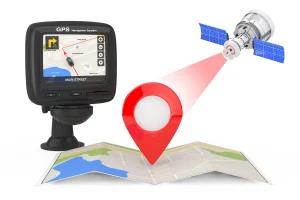GPS technology is the most impactful innovation in today’s interconnected world. Which shaped everything from daily navigation to large-scale fleet management. However, GPS Technology provides us with accurate location data in real-time. It plays an important role in asset tracking, safety monitoring, and route optimization. But many people don’t know how exactly a GPS tracker works.
In this article, we’ll discuss how a GPS tracker works. We’ll also explain the technology behind GPS tracking and how it works.
What Is GPS?
![]()
GPS stands for Global Positioning System. It is a satellite-based navigation system. The United States Department of Defense designed it for military purposes. It is now a powerful public tool available for various civilian applications worldwide.
What Is a GPS Tracker?
A GPS tracker is a portable device. This device is fitted with a GPS receiver. It is installed in a vehicle, on an asset, or to be taken by a person. This device uses satellite signals to record its current location at regular intervals in real time. These systems allow users to observe and track the location of people, vehicles, or assets.
How Does A GPS Tracker Work?
GPS trackers find their location using the Global Navigation Satellite System (GNSS). They calculate their position by measuring the distance from at least three satellites. This process provides accurate information on latitude, longitude, elevation, and time. The tracker then sends this data to software for users to view and analyze.

GPS trackers use different types of connectivity. Devices with 2G, 3G, or LTE/4G use cellular networks to send data. Satellite trackers rely completely on satellite communication. The GPS network has 27 satellites, including 24 active satellites and three backups. These satellites orbit Earth every 12 hours.
They send signals to tracking stations. To give precise information about position, speed, and time that process the data. This system supports applications like real-time asset tracking and route optimization.
Types of GPS Tracker
There are different types of GPS trackers for various uses. GPS trackers come in a range of sizes, features, and communication options. Common types of GPS trackers include personal, vehicle, asset, and pet trackers.
Personal GPS trackers are used to keep track of children or elderly family members.
Vehicle GPS trackers are often used in cars, trucks, and fleet management. They help optimize routes, observe vehicle locations, and improve security.
Asset Trackers are connected with valuable items for theft prevention and inventory management.
Pet Trackers are typically lightweight. This is designed for pets. It may include geofencing capabilities. That alerts owners if their pet wanders outside a set area.
Who Needs A GPS Tracking Device?

In today’s progressing world, we depend on GPS routes and areas in our everyday lives. GPS tracking devices have become a regular part of our lives. Different types of GPS devices are available for personal or business purposes. From family-friendly trackers to commercial fleet tracking solutions, these devices offer various features. These features provide access to the location of assets and help to track vehicle maintenance schedules, monitor speed and fuel usage, geo-fencing, analyze trends in driver behavior, and provide 24/7 customer support.
Many providers offer affordable options to make GPS tracking accessible to everyone. They offer low monthly fees and competitive pricing. A GPS vehicle tracker is a valuable tool to improve your business or vehicle security. It provides reliability, safety, and peace of mind. Embrace this technology to protect what matters most to you.
Today, many GPS tracking devices are available to meet different needs. For example, if you need a GPS tracker for vehicle monitoring, Prohori GPS Tracker is a great option. It offers standard GPS tracking services along with 24/7 customer support. It ensures reliable support and extra services at all times. Prohori is one of the most affordable GPS tracking providers in Bangladesh.
How does Prohori work?
Prohori’s GPS trackers provide a variety of needs, depending on the customer’s fleet size and vehicle type. Its easy-to-use tracking devices can be self-installed to track fleet activities. It also reads CAN trip data and gets daily notifications about fleet performance. Plug ‘n Play is a convenient option for vehicles. It requires easy installation with 3G connectivity.
It monitors risky behaviors such as over-speeding, harsh braking, harsh acceleration, sudden cornering, and excessive idling. This helps in effectively managing trips, reducing fuel costs, and monitoring driver behavior and vehicle location.
It offers low monthly fees and competitive device pricing. These features make it a cost-effective choice for individuals and businesses alike.
The Legal and Ethical Benefits of Prohori GPS Tracking
![]()
Prohori GPS tracking offers essential benefits for fleet management, supporting driver tracking and safety. It prioritizes legal and ethical standards, ensuring individuals’ consent is obtained and privacy is respected. With strong data security measures—like encryption, regular audits, and employee training—Prohori protects sensitive information, builds customer trust, and upholds ethical practices in tracking.
Conclusion
GPS tracker is a powerful tool for a business owner, a fleet manager, or someone who wants to keep loved ones safe. GPS trackers offer real-time insights and valuable data. It allows businesses to observe assets, optimize routes, reduce fuel costs, and improve security systems.
Prohori offers advanced features and a user-friendly interface for their users. Many Bangladeshi companies manage their fleets by Prohori and ensure greater efficiency and peace of mind.
